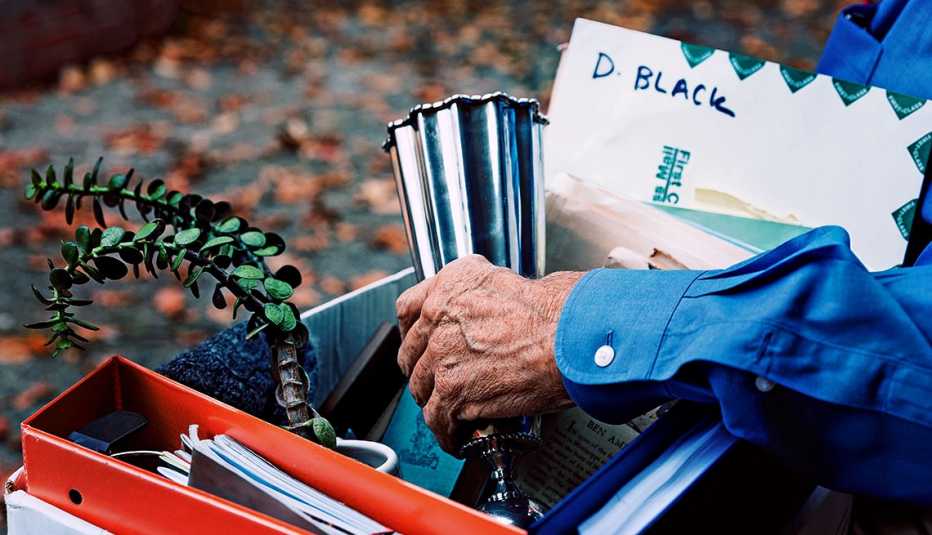AARP Hearing Center
Part 1: The reckoning
JILL BLACK WAS tidying up around the house when she came upon a bunch of receipts that her husband, Deven, had stashed in his backpack — slips from MoneyGram, Western Union and other wire-transfer services near the couple’s suburban New York home. They showed cash transfers to people Jill had never heard of. Flipping through them, she soon realized they represented thousands of dollars. She felt sick.
It was November 2013. Several weeks earlier, Jill had found a similar receipt on the dining room table, for about $300. When she asked her husband about it, he told her it was for a colleague whose relative needed help with medical expenses. Though he had been vague about the details, the story made sense to her. “Deven liked to be the hero — the one to help out,” she says.
This new stash was different. This was money she knew that he didn’t have. That they didn’t have. Her mind reeled. Deven’s career seemed to be going all right — in fact, he’d recently returned from accepting a national award for his work as a school librarian. So what on earth could this be about?
When Deven arrived home, Jill confronted him. Solidly built and standing over 6 feet tall, Deven slumped. But what struck Jill was that he didn’t seem to share her concern. And the more he shrugged things off, the more enraged Jill became. “Are you being blackmailed?” she all but screamed. He flailed for answers, and his explanations didn’t hold together. Finally, he told her the transfers were investments and assured her: “We’re going to get this money back.”
Jill didn’t believe it. The next day, she opened a bank account in her name and made arrangements to have the paychecks from her job as a writer-editor deposited there. The couple’s only child, Jonas, was in college upstate, and she wanted to protect her assets for his sake, as well as her own.
When Jill looks back to that day, she knows now it was a pivotal moment. Something was seriously wrong with Deven, but what? Was it a midlife crisis? An affair? A dawning addiction? Over the next two years, Jill would watch in something close to horror as her marriage of more than 30 years fell apart and Deven grew ever more distant — until he ended up living on the streets of New York City, lost and alone. And then came the phone call that filled in the details about her husband’s final days and brutal murder.
But before that, beginning in the fall of 2013, and for the remaining years of Deven’s life, she would try to piece together the clues: What had happened to the bright, wry, loving soul she had married? Who — or what — really killed Deven Black?
Part 2: A one-of-a-kind mind
THEY MET ON a blind date in 1980. Jill Rovitsky was visiting New York from her native St. Paul, Minnesota, and Deven played her gallant tour guide to Manhattan, where he had grown up. “Afternoon coffee became drinks became dinner, and then we must have walked around the city for hours,” recalls Jill, who today still gives off an artsy vibe with her patterned top, easy smile, specs and mass of brown curls.
Later, as she got to know Deven better, she realized he could also be shy and somewhat awkward, “but he was curious about so many things,” she says. Though he had been smart enough to get into the elite Bronx High School of Science, he had dropped out, earned his GED and at 16 was admitted to the City University of New York. He dropped out again and this time made his way to Cape Cod, where he hosted a local radio talk show. Says his father, Arthur, “He probably got a better education out of college than he would have had in it, because he never stopped learning.”
By the time Jill met Deven, he had returned to Manhattan to become the general manager of a popular downtown bar, the North Star Pub. He was, as one friend put it, “a total rock star in the world of craft beers,” introducing customers to British ales and early microbrews, and was quoted in the New York Times and elsewhere as an expert in the burgeoning field.
He was funny and sharp, with a keen sense of the absurd. (Once, when at church camp a nephew built a birdhouse that featured Christian crosses as decoration, Deven joked, “It must be for cardinals.”) He also had a streak of the fabulist in him — embellishing things he had seen or done in stories he told. Jill was a stickler for the facts. He was a spendthrift; she was frugal. It made for good sport, and they had enough in common to make it a good match. They both enjoyed folk and rock music, and were obsessed with finding cheap ethnic food throughout New York City, becoming early contributors to Chowhound, a precursor and still a competitor to Yelp. They married in 1983.


A few years later, they moved about 20 miles north of the city to the Hudson River town of Nyack, where, in 1994, they welcomed their son, Jonas.
“Deven really loved being a dad, and those were probably our closest times,” Jill says. “Sometimes your own child is the most entertaining person on earth.” Deven could be self-centered — it was one of his flaws — but he made room at the core of his world for his son. The new dad commuted to the State University of New York’s Empire State College to earn a bachelor’s degree, picked up a master’s in teaching at Fordham and joined the faculty at Castle Hill Middle School in the Bronx. But his idiosyncratic methods caused disagreements with his principal, as even Deven acknowledged. “I don’t believe in distinct subject areas. To me, knowledge is a holistic, completely interconnected, ever-growing thing,” he once told a reporter. Eventually, his principal suggested he might be a better fit as the school’s librarian.
The role suited him perfectly. Longtime friend Emily Feiner, a clinical social worker, says that excelling as an educator was serious business to Deven: “He thought deeply about educational theory and policy. He really wanted to be recognized in his field, to leave a mark, to feel he mattered.”
Part 3: Strangers in the house
DEVEN'S BEHAVIOR had always been a tad eccentric, but it began to get odder. In May 2013, a student at the Castle Hill school complained that he had made her feel uncomfortable by touching her arm and saying she looked sexy. The principal suspended him and launched an investigation. “Deven was devastated by that,” Jill recalls. “He really didn’t know he’d upset someone.”
Stuck at home in Nyack, he spent an inordinate amount of time online, emailing people Jill didn’t know. She had to insist he not bring his tablet or laptop to the dinner table. When she challenged him, he became placid and said it wouldn’t happen again but didn’t apologize. It was maddening to her, and the couple’s friends concluded he was experiencing a midlife crisis. His 60th birthday was approaching in October, and he dreaded it. His mother had been 60 when she died of the neurodegenerative disease ALS (amyotrophic lateral sclerosis), and even though doctors had told the family her case was likely sporadic, not hereditary, Deven still saw 60 as a harbinger of doom.
It was a few weeks after his birthday that Jill found the stash of wire-transfer receipts in his backpack. During her lunch hours at work, she began searching for an explanation for Deven’s behavior. Friends suggested it might be internet addiction. No, there was more to his transformation. At her job at a continuing medical education company, she has access to medical reference materials, and she would pore over the bible of psychiatric illnesses, the Diagnostic and Statistical Manual of Mental Disorders, which outlines in plain language the standard criteria for various mental illnesses. Bipolar disorder, an acquaintance speculated. Some symptoms fit, but others did not. Early-onset Alzheimer’s disease? Deven seemed to have no problems with his memory or cognition. There were times when Jill almost dropped the hunt, convincing herself she was making too much of Deven’s narcissism. But then another crisis would occur.






































































